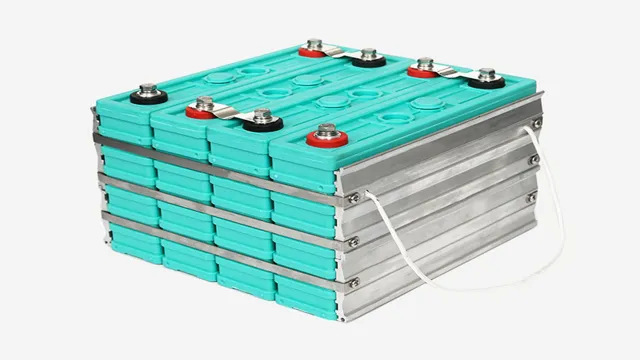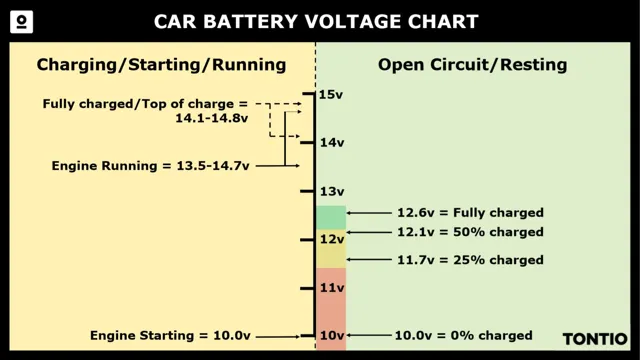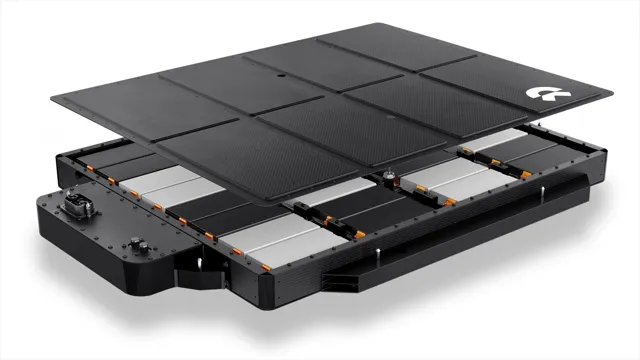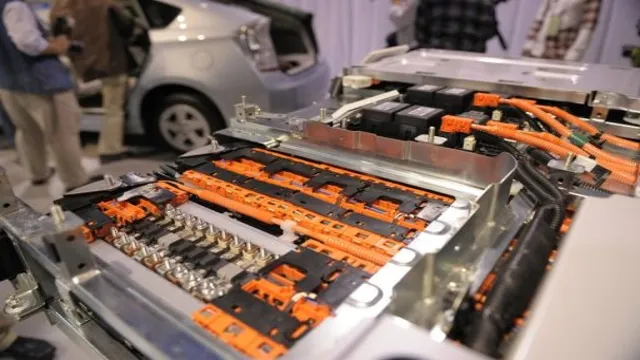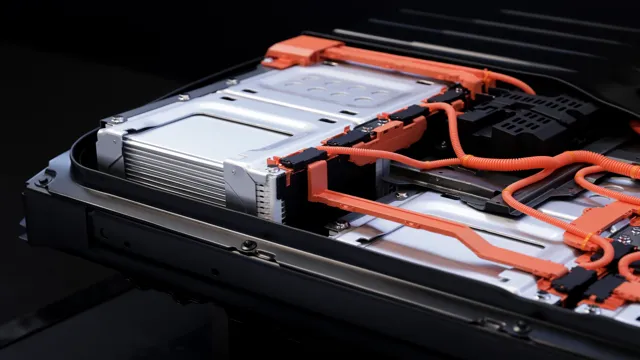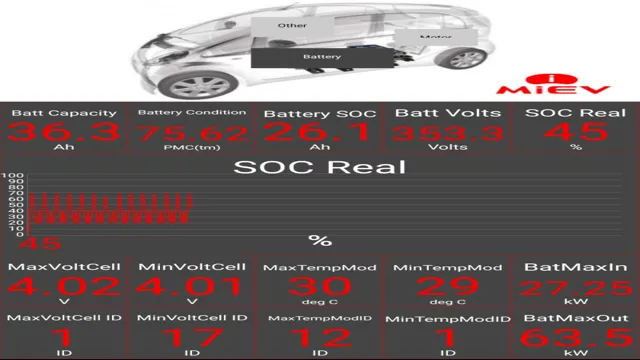The Future of Sustainable Driving: Exploring the Revolutionary Electric Car Battery Cell
Electric car battery cells are a futuristic innovation that has taken the automotive industry by storm. The power of these cells is undeniable, as they offer clean energy that is both renewable and sustainable. By switching to electric cars and utilizing these battery cells, we can significantly reduce our carbon footprint and help combat climate change.
The technology behind electric car battery cells is impressive. They work by converting chemical energy into electrical energy, which then powers the car’s electric motor. The cells themselves are made up of various components, including electrodes, electrolytes, and a separator.
When the battery is charged, the electrodes undergo a chemical reaction that stores energy. When the car is in use, the battery releases this stored energy in the form of electricity, which is used to power the car. One of the most significant benefits of electric car battery cells is their longevity.
They can last well over a decade, even with frequent use. This longevity means that the batteries don’t need to be replaced as often, which reduces waste and saves money in the long run. Another benefit of these battery cells is that they are incredibly powerful.
They offer instant torque, which means that electric cars accelerate quickly and smoothly. This power also allows electric cars to maintain consistent speeds, even when driving up steep inclines. Overall, the power of electric car battery cells is undeniable.
They offer clean, renewable energy that can help us combat climate change and reduce our carbon footprint. With their longevity and power, electric car battery cells are a game-changer, and we can expect to see more and more electric cars on the road in the coming years.
What are Electric Car Battery Cells?
An electric car battery cell is the basic building block of an electric vehicle’s battery pack. It’s responsible for storing energy within the battery and then delivering that energy to power the car’s motor. The battery cells are rechargeable and can be made from different types of materials, including lithium-ion or nickel-metal hydride.
Lithium-ion cells are the most common type used today due to their high energy density and low weight. Each cell contains a positive and negative electrode, an electrolyte, and a separator. When the battery is charged, positively charged lithium ions move from the positive electrode to the negative electrode through the electrolyte, while electrons move through an external circuit, creating a flow of electricity.
When the battery is discharged, the process is reversed, with the lithium ions moving back to the positive electrode. By stacking hundreds or thousands of these cells together, electric car manufacturers can create a powerful and efficient battery pack capable of powering an electric vehicle for hundreds of miles on a single charge.
Understanding the Basics
Electric car batteries are crucial components in electric vehicles and are made up of many individual battery cells. These cells are cylindrical or prismatic in shape, and each cell is a relatively small rechargeable battery that stores energy. These cells are made using materials that can store and release energy, including lithium-ion, nickel-metal hydride, and others.
An electric car battery typically contains hundreds to thousands of these cells, which are connected in a series or parallel to achieve the desired voltage and energy capacity. The cells are packaged together in a single unit, and together, they power the electric motor that drives the car. These cells are designed to last for many years but can degrade over time due to factors such as temperature, usage patterns, and charging cycles.
Therefore, proper management and maintenance of electric car batteries are essential to ensure their longevity and performance.
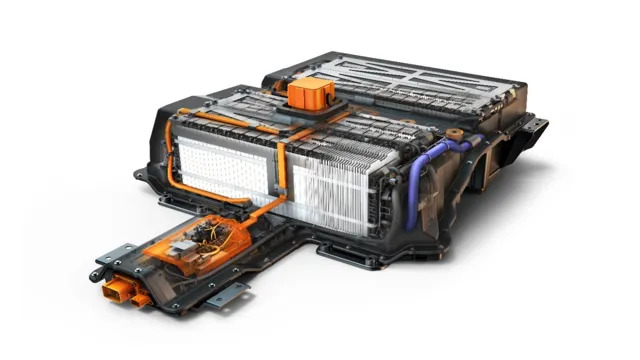
Different Types Available
Electric car battery cells are the power source that drives electric vehicles. Simply put, they are the batteries that store and release the energy required to power the vehicle. Different types of electric car battery cells are available, each with their own unique properties and applications.
Lithium-ion batteries are currently the most popular type of battery used in electric vehicles due to their high energy density and relatively low cost. Other types of electric car battery cells include Nickel-metal hydride (NiMH) and Lead-acid batteries, which are less commonly used due to their lower energy density and larger physical size. Each type of battery offers different advantages and disadvantages, making it important to choose the right one based on factors such as cost, range, and performance.
Choosing the right type of battery cell is crucial to designing an electric vehicle that meets the needs of drivers while also being environmentally sustainable.
Benefits of Electric Car Battery Cells
Electric car battery cells have proved to be a revolutionary invention that has revolutionized the automobile industry drastically. This battery technology is not only eco-friendly but also economical, which is beneficial to both the environment and consumers. They are the perfect solution for those who are looking for an alternative to conventional fossil fuel engines.
One of the major benefits of electric car battery cells is their versatility. They can be used in a wide range of vehicles, including buses, cars, and trucks. Additionally, electric car battery cells are rechargeable, which means they do not require frequent replacements, unlike conventional batteries.
Moreover, electric car battery cells can store more energy compared to their conventional counterparts, which translates to better performance. Electric car battery cells also reduce greenhouse gas emissions, which makes them eco-friendly. They are also cost-effective in the long run, as they reduce fuel and maintenance costs for vehicle owners, making it a win-win situation for both the environment and consumers.
Eco-friendly and Efficient
Electric car battery cells are becoming increasingly popular due to their numerous benefits. One of the main advantages of electric car battery cells is that they are eco-friendly. Unlike traditional gasoline-powered cars, electric car battery cells produce zero emissions, which greatly reduces their carbon footprint.
Additionally, electric cars are much more efficient than traditional cars, as they convert over 75% of the energy stored in the battery to power the wheels, while gasoline cars only convert around 20% of the energy in gasoline to power. This not only reduces air pollution but also drastically reduces energy waste. Electric car battery cells are also low maintenance as they have fewer moving parts, which means fewer chances of things breaking down.
By using electric car battery cells instead of traditional gasoline-powered cars, drivers can significantly reduce their carbon footprint, save money on fuel costs and enjoy a more efficient and hassle-free driving experience.
Low Maintenance Costs
One of the major benefits of electric car battery cells is their low maintenance costs. Compared to gasoline-powered vehicles, electric cars have fewer moving parts that need regular checks and repairs. Without an internal combustion engine, electric car owners don’t have to worry about oil changes, air filters, or spark plugs.
The only maintenance required is to keep the battery cells charged, which can be done at home or at public charging stations. And with the rapid growth of the electric car market, the costs of battery replacements and repairs are decreasing. Investing in an electric car battery cell not only saves money in the long run but also reduces carbon emissions and promotes a sustainable future.
So why not make the switch?
Improved Performance
Electric car battery cells offer numerous benefits, one of which includes improved performance. Due to advancements in technology and the increasing popularity of electric cars, battery cells have become more efficient and powerful. This means that they can store more energy, which not only extends the vehicle’s driving range but also allows for faster acceleration.
In addition, electric cars have instant torque, as the electric motor delivers power to the wheels immediately, resulting in faster acceleration than traditional gas-powered cars. Furthermore, electric cars have regenerative braking systems, which can recharge the battery when the brakes are applied, adding to the overall efficiency of the vehicle. With the continued development of electric car battery cells, we can expect even greater performance improvements in the future.
How to Choose the Right Electric Car Battery Cell
When it comes to choosing the right electric car battery cell, there are several factors to consider. One of the most important aspects to consider is the battery’s capacity, or how much energy it can store and supply. Another key consideration is the battery’s chemistry, which can impact its lifespan, charging time, and overall performance.
Some common types of battery chemistries used in electric cars include lithium-ion, nickel-metal-hydride, and lead-acid. It’s also important to consider the weight and size of the battery, as this can impact the car’s overall weight and performance. Ultimately, the right electric car battery cell will depend on a range of factors, including your budget, driving needs, and environmental considerations.
By understanding these key factors, you can choose the right electric car battery cell for your needs and help to ensure that your car runs smoothly and efficiently for years to come.
Consider Your Driving Habits
When it comes to choosing the right electric car battery cell, it’s important to consider your driving habits. Are you primarily using your electric car for short commutes? Or are you frequently taking longer road trips? Different battery cells have varying capacities and charging times, so it’s crucial to assess your needs before making a decision. If you’re someone who drives short distances frequently, a smaller battery cell may work for you.
However, if you’re frequently driving long distances, a larger and more powerful battery cell may be necessary. Additionally, if you plan on using your electric car for daily commutes and road trips alike, consider investing in a battery cell with fast charging capabilities to ensure you’re always ready to go. Ultimately, choosing the right electric car battery cell comes down to understanding your own driving habits and needs.
Look for Quality and Safety Features
When choosing an electric car battery cell, it’s crucial to look for quality and safety features to ensure optimal performance. The durability and overall reliability of the battery cell should be a top priority. The quality of the material used to manufacture the battery cell affects its output and longevity.
Inferior quality materials are more prone to wear and tear, causing the battery to deteriorate faster. Safety features such as temperature control, overcharging, and over-discharging protection are also critical factors. Overcharging can damage the battery, while over-discharging can result in a shorter battery life span.
Good temperature control ensures that the battery does not overheat, leading to malfunction or even a fire. It’s essential to understand the battery’s quality and safety features to make an informed decision, whether you’re replacing an old battery cell or buying a new electric car. Ultimately, investing in a high-quality battery cell ensures that you get good value for your money and a long-lasting, reliable power source for your vehicle.
Conclusion: Embrace the Future of Transportation
In conclusion, electric car battery cells are like the reliable best friend that always has your back. They may not be flashy or attention-grabbing, but they consistently power your vehicle and allow you to go the distance. So next time you’re cruising in your electric car, take a moment to appreciate the simple yet crucial role that battery cells play in our journey towards a cleaner, greener future.
After all, without them, we’d be stuck on the side of the road with a dead battery and a long walk home!”
FAQs
What is an electric car battery cell?
An electric car battery cell is the basic unit of an electric vehicle’s energy storage system. It is responsible for storing and releasing energy to power the vehicle.
How does an electric car battery cell work?
An electric car battery cell works by converting chemical energy into electrical energy using an electrolyte solution and two electrodes, a positive and negative.
What are the advantages of electric car battery cells over traditional combustion engines?
Electric car battery cells are more efficient, produce lower emissions, and have lower long-term operational costs than traditional combustion engines.
How long does an electric car battery cell last?
The lifespan of an electric car battery cell depends on several factors, including usage and environmental conditions. However, most electric car battery cells are designed to last for 100,000 to 200,000 miles.
